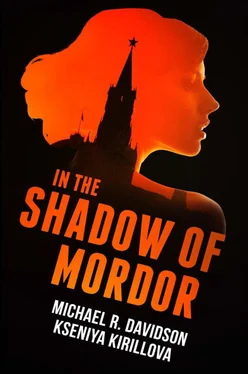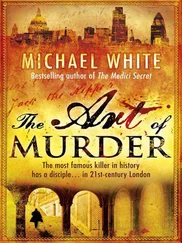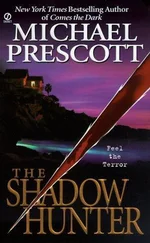The slightest indication of approval from members of the organization, the smallest gesture or nod of the head, confirmed her personal value.
She rushed away from Vlad to find Solntsev to warn him about the filthy slander his enemies planned to publish. She found him surrounded by television cameras in the main hall giving an improvised press conference.
After fifteen minutes, he made his way to the exit with an apology to the press that he had an important meeting with someone from the Ministry.
She rushed after him. “Gleb, we have to talk. It’s urgent.”
“I can’t right now, Olga. I’ll be in the office this evening after seven. Come then.”
Now, on Lubyanka Square, she had second thoughts about going to Solntsev’s office. She was sure he had forgotten already about seeing her.
But this was important. In only a few days terrible and slanderous “revelations” would be made public naming the man she held dearest a murderer and terrorist. She couldn’t live without telling him. It was impossible to explain to people like Vlad how her entire being was defined by the organization. She had no choice but to warn Solntsev.
She rushed along the sidewalk on Bol’shaya Lubyanka Street, past FSB Headquarters looming on the right. It was nearly three-quarters of a mile to the intersection with Sretenka Street, but she barely noticed the distance. “ Svoi ” maintained an office here hidden away from prying eyes inside a courtyard.
Gleb was waiting for her.
She spoke clearly and concisely, like a soldier reporting on an important mission. She told him how she knew Vlad, who his father was, and most importantly, the plan to slander Gleb in the press.
The act of doing her duty produced nearly a physical catharsis, as though her energy were being renewed.
Solntsev listened attentively. When she finished, he smiled and said, “I would never have believed that you knew the son of Sergey Illarionov. He’s one of the most dangerous journalists in the country. I haven’t figured out who he’s working for, but for a long time now he’s manufactured a wild and crazy campaign against key people. It’s well known that his articles don’t contain a grain of truth. But you know Goebbels’ basic rule of propaganda: the more outrageous the lie, the easier it is to believe. Illarionov never bothers with evidence. He just makes a lot of noise and sows doubt in the hearts of our people.”
“So what’s to be done about it?” Olga was alarmed. “He will cause a lot of trouble this time. A lot of people might believe him…”
“Don’t worry.” He was unperturbed. “We have only one weapon on our side — the truth, and it is we who must deliver it. Sooner or later the entire web of slanderers will collapse upon itself. But I’m very grateful to you. You acted correctly. Now we know what to expect.”
Olga’s alarm turned to pride. Gleb was strong and kind, as always, prepared to face any threat. “They should all be exiled,” she said, surprising herself. “They are so arrogant.”
He only smiled and led her to the door.
*****
Dark thoughts consumed Solntsev. The information in Illarionov’s hands could be published at any time. He shuddered like a criminal about to be caught, and this incensed him. What had this upstart dug up after fifteen years? Who did he know in Ryazan that might have helped him?
He grabbed his jacket from a peg on the wall and hurried out of the office. He had to take action before it was too late.
*****
The day after the Kremlin affair, Vlad Illarionov was editing the video he had shot there, adding commentary where needed. He also spliced in scenes of “ Svoi ” activities not intended for public exposure.
It was the end of the day by the time he turned to his computer to dredge up the news. “AT ILOVAYSKIY, THE DONBAS MILITIA DEALT A RESOUNDING BLOW TO THE KIEV JUNTA…” Propaganda .
“THE PRICE OF OIL REACHED A TEN-YEAR LOW.”
“IN CHELYABINSK A CHILD FELL FROM A TENTH STORY WINDOW OF A MULTI-STORY BUILDING.”
A tautology right in the title , he thought, and then mentally chastised himself for being so accustomed to deaths in the news that the life even of a child had not affected him.
The next headline jerked him upright in his chair” “LAST NIGHT IN THE RYAZAN PRISON FORMER FSB OFFICER VIKTOR TRETYAKOV COMMITTED SUICIDE…”
His father had just returned from Ryazan. Vlad could not know for certain that it had been Tretyakov his father had met there — Sergey Illarionov never mentioned the names of his sources before publishing an article. But on the flickering screen of his monitor, the news about Tretyakov glowed like an omen.
Someone in Ryazan told his father about Solntsev’s crimes, someone who had worked with Solntsev in the past. So it could only be an FSB officer. Why would he have revealed such information to an opposition journalist?
Vlad was seized by a quiet panic and paced the room trying to decide what to do. Call his father’s cell phone? But what to say? “ Papa, did you meet with a Viktor Tretyakov from the FSB?” But such things were not discussed on the phone. Besides, his father had likely already seen the news. He would know what to do. Maybe he could just call and ask when his father would be coming home. But this seemed childish. It was still light outside, and his father often was out until dark. He might be conducting an important interview.
Vlad went to the window overlooking the courtyard. A thin line of trees between the building and the sidewalk lent some coziness to the two-room apartment. The leaves of an overgrown poplar brushed against the window sill.
Vlad squinted through the leaves. From the fourth floor he had a good view of the iron frame of the toy rocket with its peeling paint, a relic of Soviet times. He had played in the courtyard as a child. Beyond the rocket was a new playground with a tall slide and large sandbox. There was a bench near-by, shaded by birches, where two mothers were smoking and drinking beer. They shouted occasionally at their children playing in the sand.
He could hear the screech of the swings with their long metal beams and worn wooden seats. The swings, too, had been in the courtyard as long as Vlad could remember, and not once had they been lubricated. Now, as a child swung in vigorous arcs, they complained, clanging and screeching as though about to break apart.
Vlad resumed editing his video in a vain attempt to quiet his fears. The last pre-twilight rays of the sun, filtered through a lacework of clouds, penetrated the room, and traversed the wallpaper, moving closer to Vlad’s desk, but failed to reach it before disappearing into the carpet.
After two more hours Vlad finally punched his father’s number into his cell phone and listened to the far off ringing.
“Papa, where are you?”
“On my way home.” Sergey Illarionov sounded in a good mood. “I was in Yasenevo, and you know how long it takes to get there. I took the subway this morning because it was quicker than the car. Now I’m taking a shortcut through the park. I’ll be there in a half-hour.”
“It’s not the best idea to be strolling through the park in the dark. Remember, there was a murder there not long ago. They’re still writing about the ‘Bittsevskiy Maniac.’”
“He’s long gone,” replied Sergey. “There’s little to fear in the woods while the biggest maniac of all is sitting in the Kremlin.”
Vlad chuckled with relief at his father’s playful tone. He was abashed that he had become so agitated, like a frightened child. He went back to work and did not notice the passing time.
After a half-hour passed he hesitated to call his father again, not wanting to play the fool. Perhaps Sergey had miscalculated the time it would take to get home. It normally took no more than an hour to walk the whole way through Bittsevskiy Park to Krasniy Mayok Street.
Читать дальше












